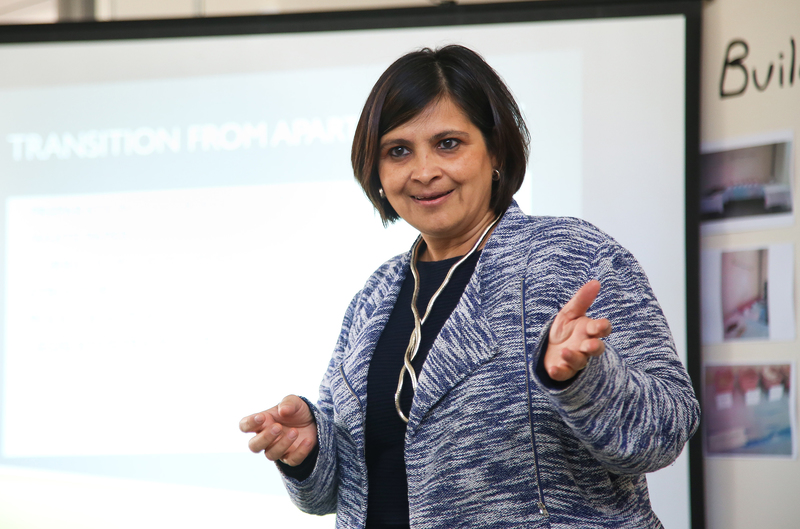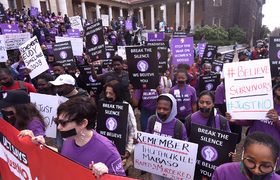‘I’m seeing activism in South Africa’
12 November 2019 | Story Niémah Davids. Photo Je’nine May. Read time 5 min.
“The world we live in is frightening and it’s not only [as a result] of gender-based violence (GBV); it’s a lack of humility, an increase in fascism, and we really need to do something about it.”
This was the message University of Cape Town (UCT) Council member Nazeema Mohamed shared with delegates during a special UCT Transformation Forum event on Thursday, 7 November, at the Tshisimani Centre for Activist Education in Mowbray.
Mohamed is also the executive director of Inyathelo – a non-profit organisation that works to sustain and strengthen civil society organisations and grow local philanthropy in support of a vibrant South African democracy.
The forum meeting was an opportunity for university structures, researchers and practitioners – whose focus is transformation, inclusion and diversity within education – and other interested parties to join forces, connect and share knowledge and ideas.
Organised by the UCT Office for Inclusivity and Change (OIC), the event was themed: “Transformation Practice or Activist Praxis: Tools and practices for challenging oppression in higher education”.
“The good thing that I’m seeing is the activism in South Africa. We are not sitting back.”
“If we stand together, we can defeat patriarchy. I say that with optimism. It’s been a hard journey. [We feel] a sense of helplessness and hopelessness – what’s happened to our grandmothers and to us is now happening to our daughters,” said Mohamed.
“The good thing that I’m seeing is the activism in South Africa. We are not sitting back, and I feel a sense of hopefulness.”
National plan for gender-based violence
Government’s proposed plan on how it wishes to respond to the scourge of GBV at a country level already exists, she added, but input from higher education institutions has been non-existent.
“The national plan for gender-based violence is around. Last [time] I looked for it, it was still with the Department of Justice [and Constitutional Development], but it has emerged.”
She questioned why delegates in the higher education sector, working to address this issue within their institutions, have not been privy to any of the plan’s workings or other information it may contain.
“We haven’t seen it. Why haven’t we seen it and why haven’t we [contributed any input] on that policy, or the national action plan on gender-based violence? Where are the universities [in this process]?”
Next steps for universities
Redrafting and amending policies in order to effectively respond to GBV is step one. In other words, Mohamed said, examining what has been done, what hasn’t worked and why it hasn’t now needs to take centre stage.
But amending policies also needs clear performance objectives and indicators that delegates in the field should work strictly towards, she stressed.
“Have we established a baseline [for this work], what is our timeframe and what is the budget?”
Questions around human capacity – who establishes offices to respond adequately, who will do the work, and who will work with staff and students – also warrants a response. Upskilling delegates on how to effectively respond to GBV is equally important and should form part of an institution’s baseline plan, she explained.
Driving accountability
It will take work and accountability in all spheres of tertiary institutions and this is fundamental, Mohamed said.
Accountability may also need to take a top-down approach. While national government needs to remain accountable, it needs to drive that sense of accountability down towards the institutions, and similarly, institutions should ensure staff and students remain accountable too.
“Know your rights, know what to do and how to take action.”
“Management is where it starts, and in management there needs to be structures, balance, respect, communication, training and personal empowerment. It’s the most important tool.
“Know your rights, know what to do and how to take action,” Mohamed concluded.
 This work is licensed under a Creative Commons Attribution-NoDerivatives 4.0 International License.
This work is licensed under a Creative Commons Attribution-NoDerivatives 4.0 International License.
Please view the republishing articles page for more information.










